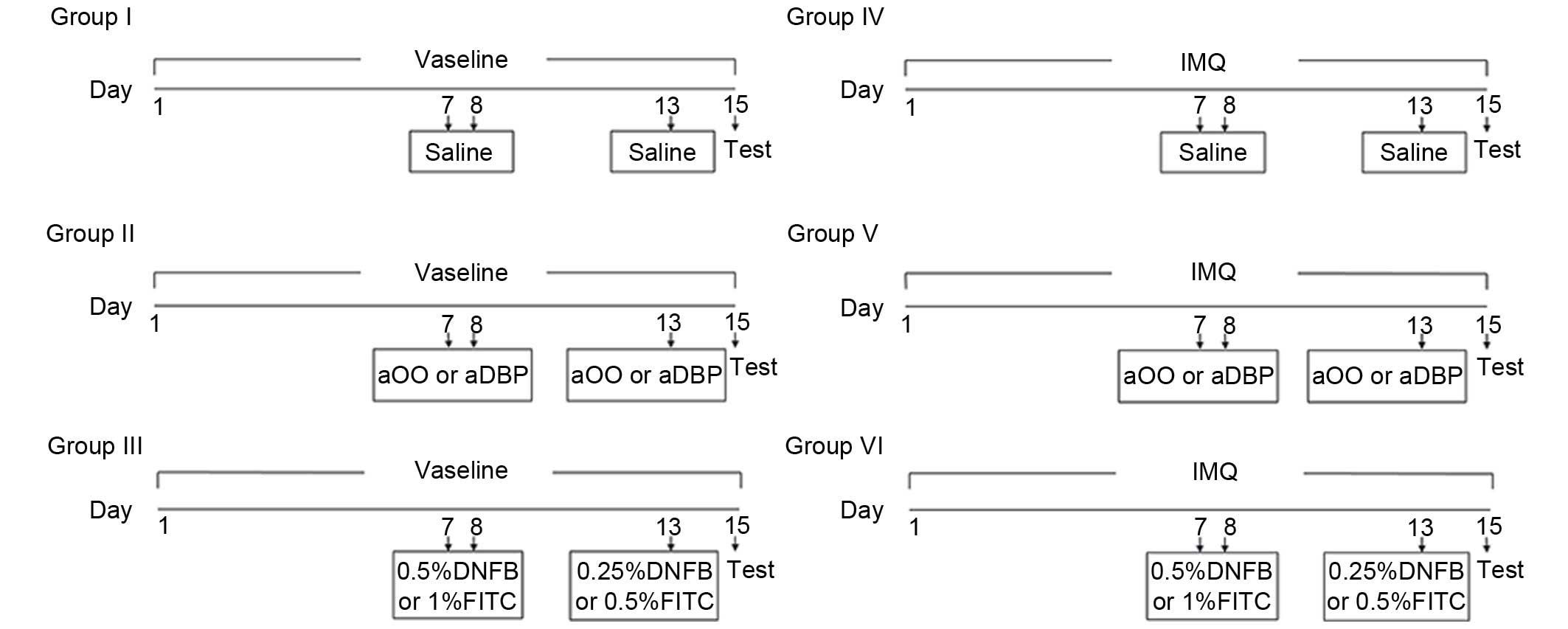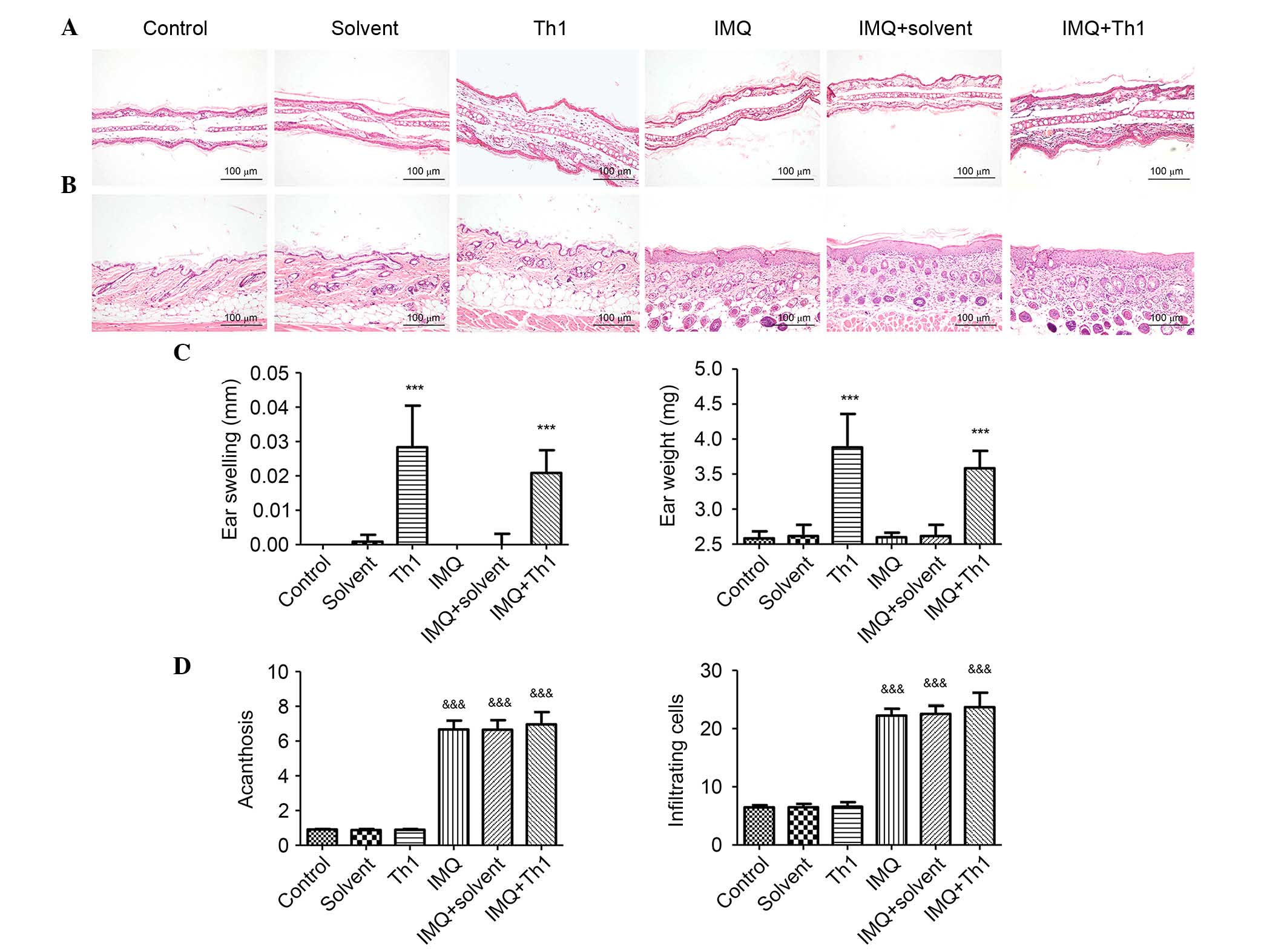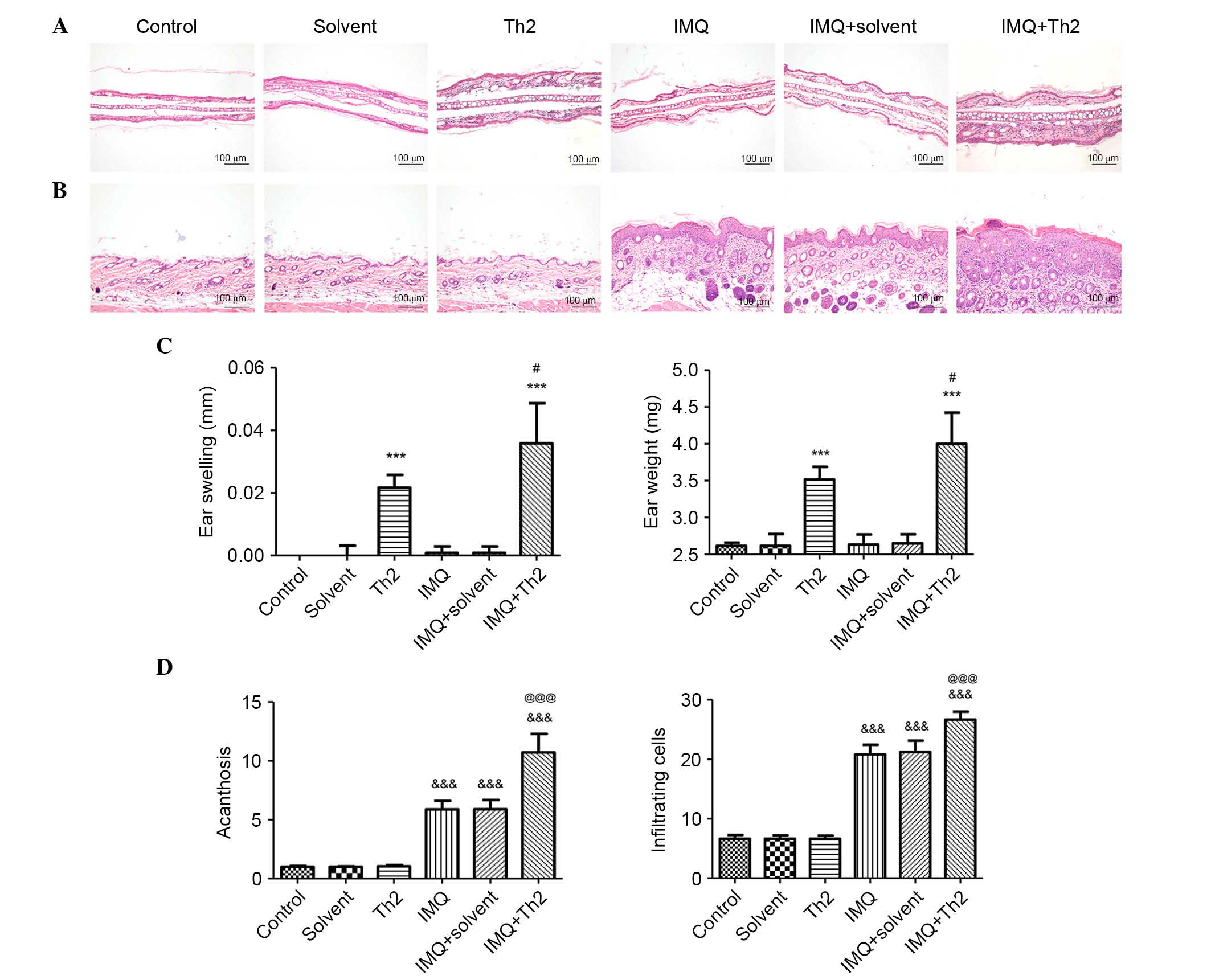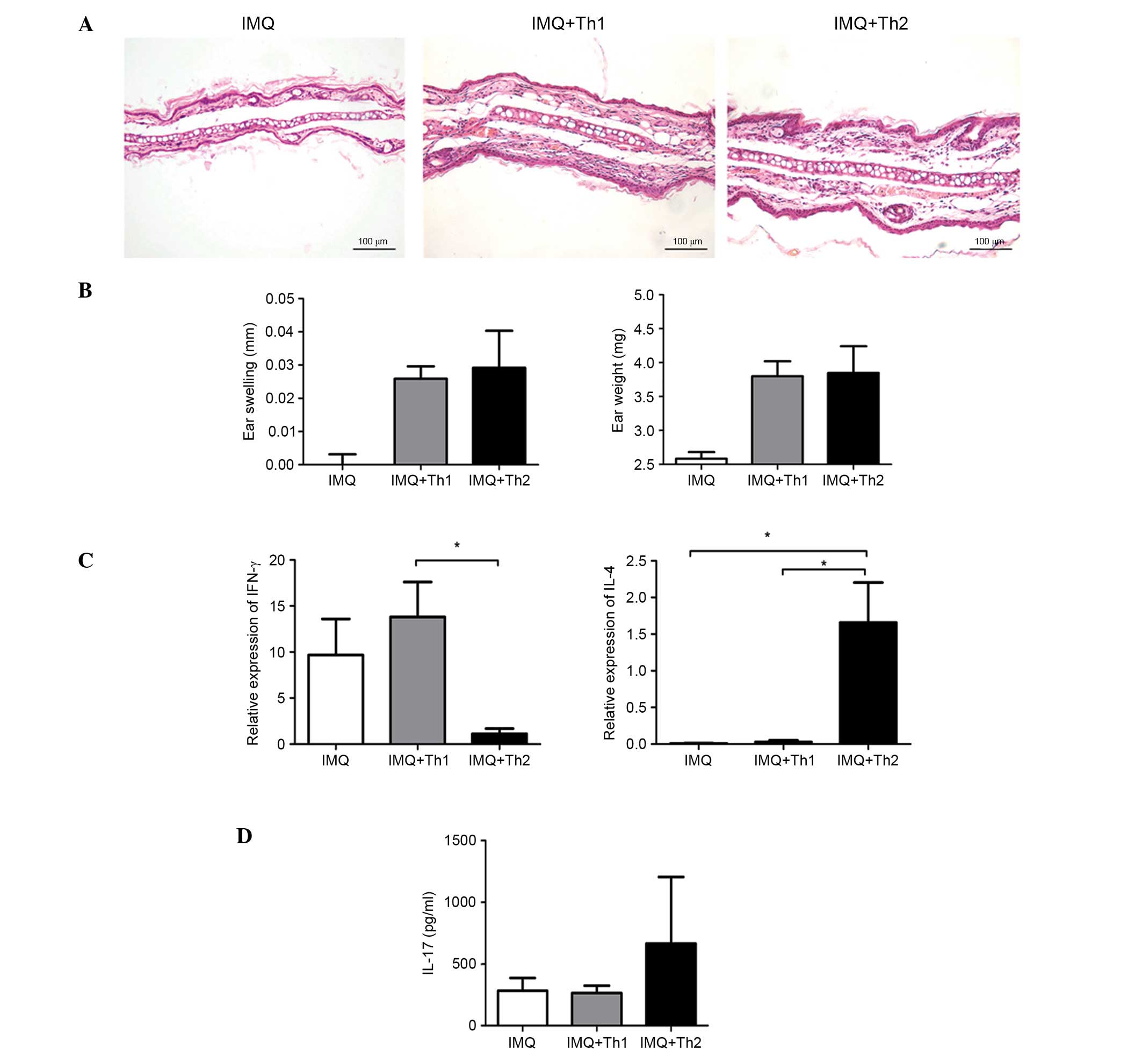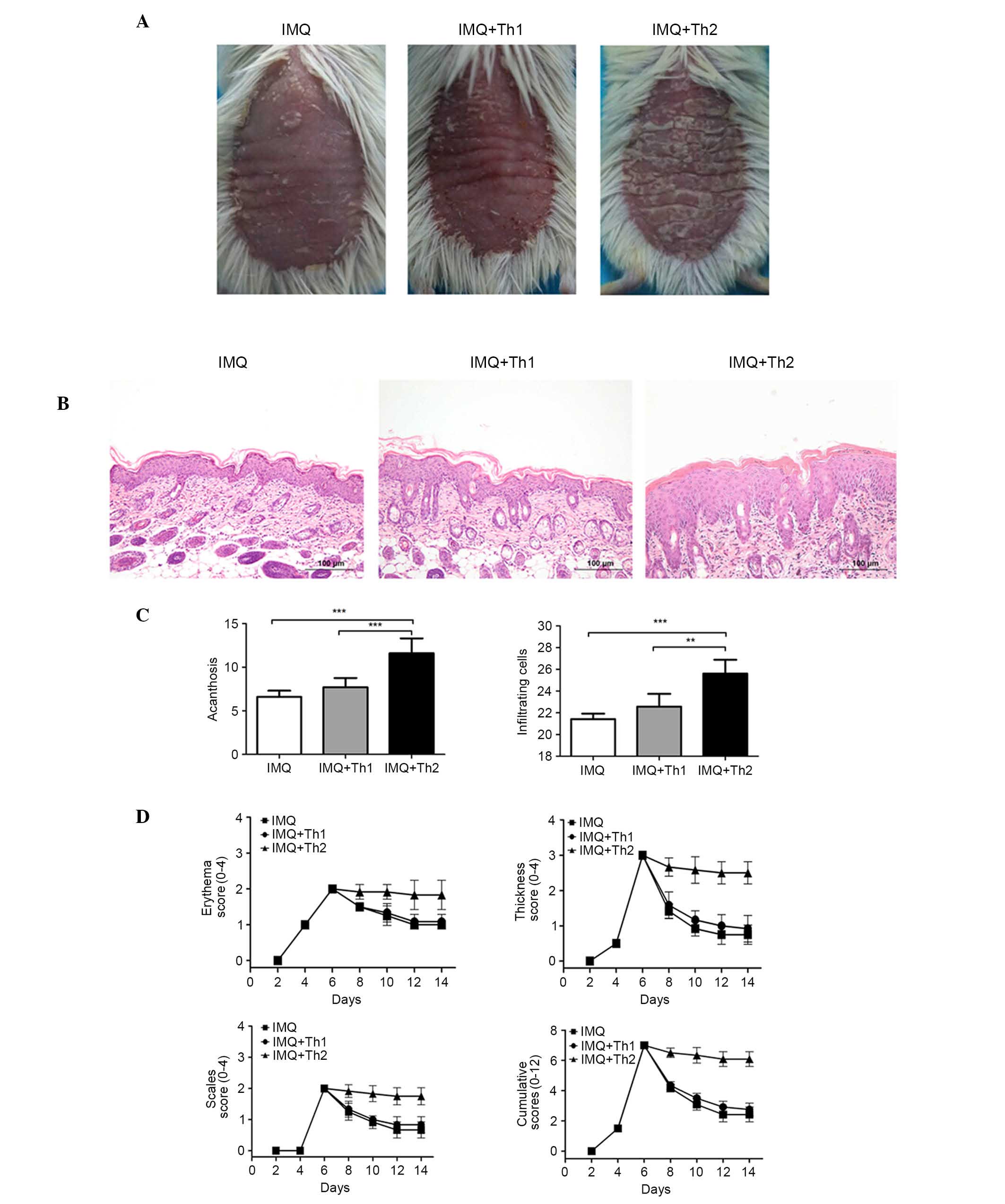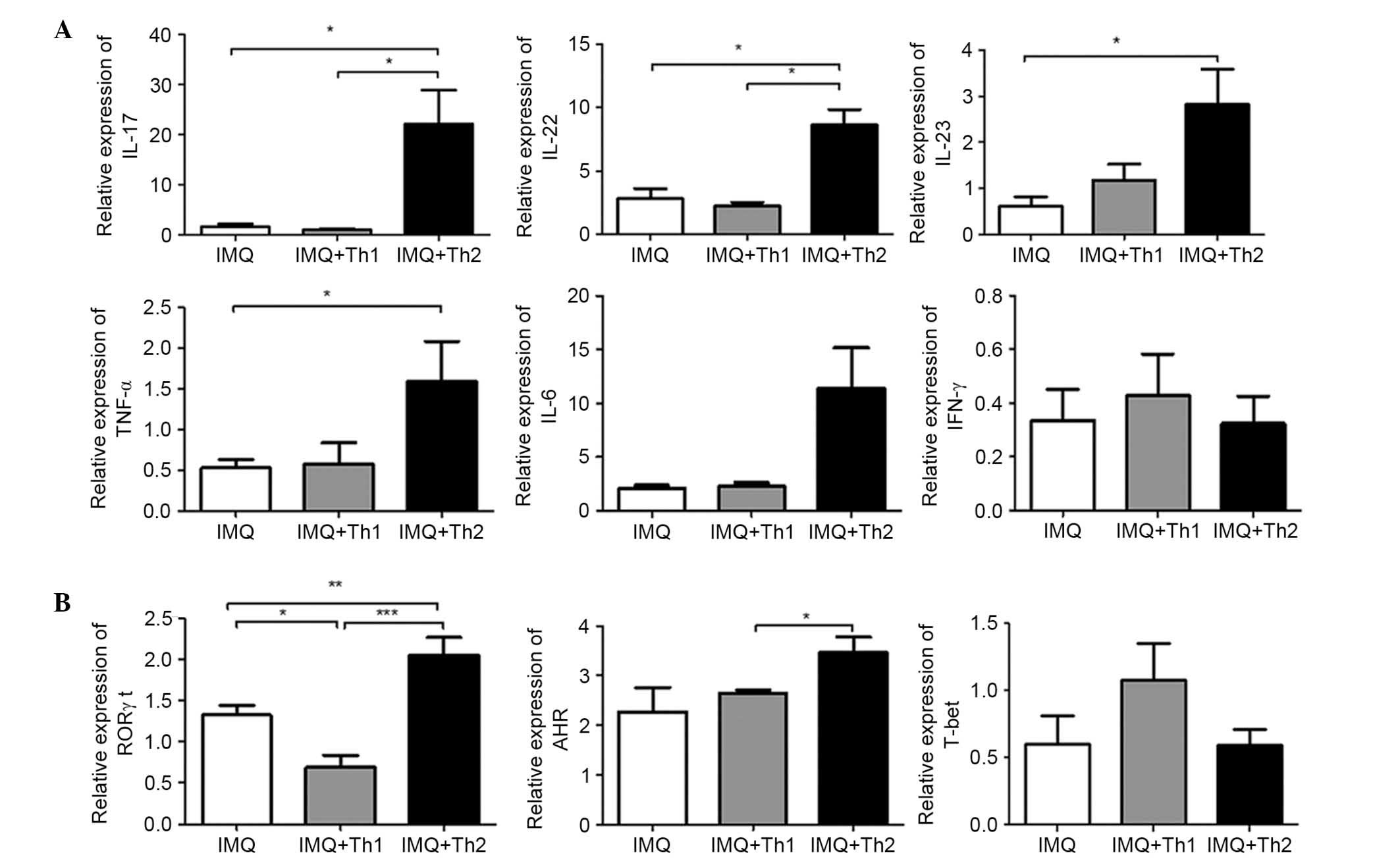|
1
|
Bangsgaard N, Engkilde K, Thyssen JP,
Linneberg A, Nielsen NH, Menné T, Skov L and Johansen JD: Inverse
relationship between contact allergy and psoriasis: Results from a
patient- and a population-based study. Br J Dermatol.
161:1119–1123. 2009. View Article : Google Scholar : PubMed/NCBI
|
|
2
|
Guttman-Yassky E, Nograles KE and Krueger
JG: Contrasting pathogenesis of atopic dermatitis and
psoriasis-part I: Clinical and pathologic concepts. J Allergy Clin
Immunol. 127:1110–1118. 2011. View Article : Google Scholar : PubMed/NCBI
|
|
3
|
Guttman-Yassky E, Nograles KE and Krueger
JG: Contrasting pathogenesis of atopic dermatitis and
psoriasis-part II: Immune cell subsets and therapeutic concepts. J
Allergy Clin Immunol. 127:1420–1432. 2011. View Article : Google Scholar : PubMed/NCBI
|
|
4
|
Camargo CM, Brotas AM, Ramos-e-Silva M and
Carneiro S: Isomorphic phenomenon of Koebner: Facts and
controversies. Clin Dermatol. 31:741–749. 2013. View Article : Google Scholar : PubMed/NCBI
|
|
5
|
Kurz C, Wunderlich S, Spieler D, Schwaiger
BJ, Andres C, Traidl-Hoffmann C and Ilg R: Acute transverse
myelitis and psoriasiform dermatitis associated with Sjoegren's
syndrome: A case report. BMC Res Notes. 7:5802014. View Article : Google Scholar : PubMed/NCBI
|
|
6
|
Jain S, Kaur IR, Das S, Bhattacharya SN
and Singh A: T helper 1 to T helper 2 shift in cytokine expression:
An autoregulatory process in superantigen-associated psoriasis
progression? J Med Microbiol. 58:180–184. 2009. View Article : Google Scholar : PubMed/NCBI
|
|
7
|
Martin DA, Towne JE, Kricorian G, Klekotka
P, Gudjonsson JE, Krueger JG and Russell CB: The emerging role of
IL-17 in the pathogenesis of psoriasis: Preclinical and clinical
findings. J Invest Dermatol. 133:17–26. 2013. View Article : Google Scholar
|
|
8
|
Lynde CW, Poulin Y, Vender R, Bourcier M
and Khalil S: Interleukin 17A: Toward a new understanding of
psoriasis pathogenesis. J Am Acad Dermatol. 71:141–150. 2014.
View Article : Google Scholar : PubMed/NCBI
|
|
9
|
Michalak-Stoma A, Bartosińska J, Kowal M,
Juszkiewicz-Borowiec M, Gerkowicz A and Chodorowska G: Serum levels
of selected Th17 and Th22 cytokines in psoriatic patients. Dis
Markers. 35:625–631. 2013. View Article : Google Scholar : PubMed/NCBI
|
|
10
|
Nakajima K: Critical role of the
interleukin-23/T-helper 17 cell axis in the pathogenesis of
psoriasis. J Dermatol. 39:219–224. 2012. View Article : Google Scholar : PubMed/NCBI
|
|
11
|
Works MG, Yin F, Yin CC, Yiu Y, Shew K,
Tran TT, Dunlap N, Lam J, Mitchell T, Reader J, et al: Inhibition
of TYK2 and JAK1 ameliorates imiquimod-induced psoriasis-like
dermatitis by inhibiting IL-22 and the IL-23/IL-17 axis. J Immunol.
193:3278–3287. 2014. View Article : Google Scholar : PubMed/NCBI
|
|
12
|
Honda T, Egawa G, Grabbe S and Kabashima
K: Update of immune events in the murine contact hypersensitivity
model: Toward the understanding of allergic contact dermatitis. J
Invest Dermatol. 133:303–315. 2013. View Article : Google Scholar
|
|
13
|
Sugaya M, Kuwano Y, Suga H, Miyagaki T,
Ohmatsu H, Kadono T, Okochi H, Blauvelt A, Tamaki K and Sato S:
Lymphatic dysfunction impairs antigen-specific immunization, but
augments tissue swelling following contact with allergens. J Invest
Dermatol. 132:667–676. 2012. View Article : Google Scholar
|
|
14
|
Nakajima S, Kitoh A, Egawa G, Natsuaki Y,
Nakamizo S, Moniaga CS, Otsuka A, Honda T, Hanakawa S, Amano W, et
al: IL-17A as an inducer for Th2 immune responses in murine atopic
dermatitis models. J Invest Dermatol. 134:2122–2130. 2014.
View Article : Google Scholar : PubMed/NCBI
|
|
15
|
Dhingra N, Shemer A, Correa da Rosa J,
Rozenblit M, Fuen-tes-Duculan J, Gittler JK, Finney R, Czarnowicki
T, Zheng X, Xu H, et al: Molecular profiling of contact dermatitis
skin identifies allergen-dependent differences in immune response.
J Allergy Clin Immunol. 134:362–372. 2014. View Article : Google Scholar : PubMed/NCBI
|
|
16
|
Hopkins JE, Naisbitt DJ, Kitteringham NR,
Dearman RJ, Kimber I and Park BK: Selective haptenation of cellular
or extra-cellular protein by chemical allergens: Association with
cytokine polarization. Chem Res Toxicol. 18:375–381. 2005.
View Article : Google Scholar : PubMed/NCBI
|
|
17
|
Ogawa A, Yoshizaki A, Yanaba K, Ogawa F,
Hara T, Muroi E, Takenaka M, Shimizu K, Hasegawa M, Fujimoto M, et
al: The differential role of L-selectin and ICAM-1 in Th1-type and
Th2-type contact hypersensitivity. J Invest Dermatol.
130:1558–1570. 2010. View Article : Google Scholar : PubMed/NCBI
|
|
18
|
Larsen JM, Bonefeld CM, Poulsen SS,
Geisler C and Skov L: IL-23 and T (H)17-mediated inflammation in
human allergic contact dermatitis. J Allergy Clin Immunol.
123:486–492. 2009. View Article : Google Scholar
|
|
19
|
van Beelen AJ, Teunissen MB, Kapsenberg ML
and de Jong EC: Interleukin-17 in inflammatory skin disorders. Curr
Opin Allergy Clin Immunol. 7:374–381. 2007. View Article : Google Scholar : PubMed/NCBI
|
|
20
|
Louten J, Boniface K and de Waal Malefyt
R: Development and function of TH17 cells in health and disease. J
Allergy Clin Immunol. 123:1004–1011. 2009. View Article : Google Scholar : PubMed/NCBI
|
|
21
|
Jovanović M, Boza P, Karadaglić D, Brkić
S, Petrović A, Mimica-Dukić N, Anackov G and Poljacki M: Contact
sensitivity in patients with psoriasis in Vojvodina. Int Arch
Allergy Immunol. 148:311–320. 2009. View Article : Google Scholar
|
|
22
|
Pigatto PD: Atopy and contact
sensitization in psoriasis. Acta Derm Venereol Suppl (Stockh).
19–20. 2000. View Article : Google Scholar
|
|
23
|
van der Fits L, Mourits S, Voerman JS,
Kant M, Boon L, Laman JD, Cornelissen F, Mus AM, Florencia E, Prens
EP and Lubberts E: Imiquimod-induced psoriasis-like skin
inflammation in mice is mediated via the IL-23/IL-17 axis. J
Immunol. 182:5836–5845. 2009. View Article : Google Scholar : PubMed/NCBI
|
|
24
|
Qin S, Wen J, Bai XC, Chen TY, Zheng RC,
Zhou GB, Ma J, Feng JY, Zhong BL and Li YM: Endogenous n-3
polyunsaturated fatty acids protect against imiquimod-induced
psoriasis-like inflammation via the IL-17/IL-23 axis. Mol Med Rep.
9:2097–2104. 2014.PubMed/NCBI
|
|
25
|
Onoue A, Kabashima K, Kobayashi M, Mori T
and Tokura Y: Induction of eosinophil- and Th2-attracting epidermal
chemokines and cutaneous late-phase reaction in tape-stripped skin.
Exp Dermatol. 18:1036–1043. 2009. View Article : Google Scholar : PubMed/NCBI
|
|
26
|
Livak KJ and Schmittgen TD: Analysis of
relative gene expression data using real-time quantitative PCR and
the 2(-Delta Delta C(T)) method. Methods. 25:402–408. 2001.
View Article : Google Scholar
|
|
27
|
Rabin RL and Levinson AI: The nexus
between atopic disease and autoimmunity: A review of the
epidemiological and mechanistic literature. Clin Exp Immunol.
153:19–30. 2008. View Article : Google Scholar : PubMed/NCBI
|
|
28
|
Ghoreschi K, Weigert C and Röcken M:
Immunopathogenesis and role of T cells in psoriasis. Clin Dermatol.
25:574–580. 2007. View Article : Google Scholar : PubMed/NCBI
|
|
29
|
Cai Y, Fleming C and Yan J: New insights
of T cells in the pathogenesis of psoriasis. Cell Mol Immunol.
9:302–309. 2012. View Article : Google Scholar : PubMed/NCBI
|
|
30
|
Al-Robaee AA, Al-Zolibani AA, Al-Shobili
HA, Kazamel A and Settin A: IL-10 implications in psoriasis. Int J
Health Sci (Qassim). 2:53–58. 2008.
|
|
31
|
Weigert C, Röcken M and Ghoreschi K:
Interleukin 4 as a potential drug candidate for psoriasis. Expert
Opin Drug Discov. 3:357–368. 2008. View Article : Google Scholar : PubMed/NCBI
|
|
32
|
Nishimoto S, Kotani H, Tsuruta S, Shimizu
N, Ito M, Shichita T, Morita R, Takahashi H, Amagai M and Yoshimura
A: Th17 cells carrying TCR recognizing epidermal autoantigen induce
psoriasis-like skin inflammation. J Immunol. 191:3065–3072. 2013.
View Article : Google Scholar : PubMed/NCBI
|
|
33
|
Singh TP, Schön MP, Wallbrecht K,
Michaelis K, Rinner B, Mayer G, Schmidbauer U, Strohmaier H, Wang
XJ and Wolf P: 8-methoxypsoralen plus ultraviolet A therapy acts
via inhibition of the IL-23/Th17 axis and induction of
Foxp3+regulatory T cells involving CTLA4 signaling in a
psoriasis-like skin disorder. J Immunol. 184:7257–7267. 2010.
View Article : Google Scholar : PubMed/NCBI
|
|
34
|
Lowes MA, Russell CB, Martin DA, Towne JE
and Krueger JG: The IL-23/T17 pathogenic axis in psoriasis is
amplified by keratinocyte responses. Trends Immunol. 34:174–181.
2013. View Article : Google Scholar : PubMed/NCBI
|
|
35
|
Nakagawa R, Yoshida H, Asakawa M, Tamiya
T, Inoue N, Morita R, Inoue H, Nakao A and Yoshimura A: Pyridone 6,
a pan-JAK inhibitor, ameliorates allergic skin inflammation of
NC/Nga mice via suppression of Th2 and enhancement of Th17. J
Immunol. 187:4611–4620. 2011. View Article : Google Scholar : PubMed/NCBI
|
|
36
|
Volpe E, Pattarini L, Martinez-Cingolani
C, Meller S, Donnadieu MH, Bogiatzi SI, Fernandez MI, Touzot M,
Bichet JC, Reyal F, et al: Thymic stromal lymphopoietin links
keratinocytes and dendritic cell-derived IL-23 in patients with
psoriasis. J Allergy Clin Immunol. 134:373–381. 2014. View Article : Google Scholar : PubMed/NCBI
|
|
37
|
Moss C, Friedmann PS and Shuster S:
Impaired contact hypersensitivity in untreated psoriasis and the
effects of photochemotherapy and dithranol/UV-B. Br J Dermatol.
105:503–508. 1981. View Article : Google Scholar : PubMed/NCBI
|
|
38
|
Bangsgaard N, Engkilde K, Menné T,
Løvendorf M, Jacobsen GK, Olsen J and Skov L: Impaired hapten
sensitization in patients with autoimmune disease. Clin Exp
Immunol. 165:310–317. 2011. View Article : Google Scholar : PubMed/NCBI
|
|
39
|
Hajdarbegovic E, Nijsten T, Westgeest A,
Habraken F, Hollestein L and Thio B: Decreased prevalence of atopic
features in patients with psoriatic arthritis, but not in psoriasis
vulgaris. J Am Acad Dermatol. 68:270–277. 2013. View Article : Google Scholar
|
|
40
|
Caca-Biljanovska N, V'Lckova-Laskoska M,
Balabanova-Stefanova M and Grivceva-Panovska V: Frequency of
delayed-type hypersensitivity to contact allergens in palmo-plantar
psoriasis. Prilozi. 26:131–141. 2005.
|
|
41
|
Krupashankar DS and Manivasagam SR:
Prevalence and relevance of secondary contact sensitizers in
subjects with psoriasis. Indian Dermatol Online J. 3:177–181. 2012.
View Article : Google Scholar : PubMed/NCBI
|
|
42
|
Malhotra V, Kaur I, Saraswat A and Kumar
B: Frequency of patch-test positivity in patients with psoriasis: A
prospective controlled study. Acta Derm Venereol. 82:432–435. 2002.
View Article : Google Scholar
|















